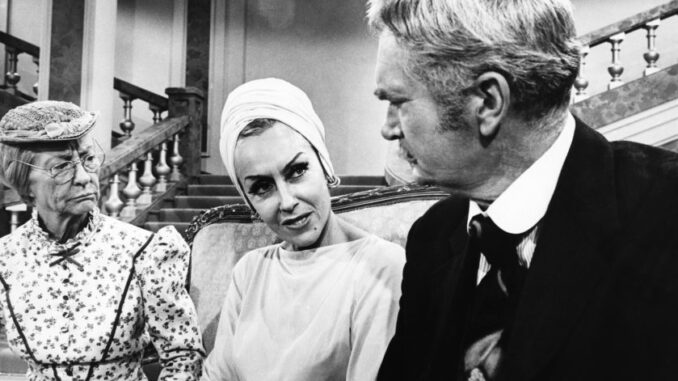
7 darn tootin’ true facts about ‘The Beverly Hillbillies’
The story of the Clampetts involves casinos, kangaroos, bluegrass singing stockbrokers, and millions upon millions of Americans

Come and listen to our story ’bout a man named Jed. The tale of an Ozark family who strikes it rich, The Beverly Hillbillies was one of the true cultural phenomenons of the 1960s. Before Beatlemania, a serious case of Clampett Fever swept the nation. Jed, Granny, Jethro and Elly May became household names overnight, thanks to the sitcom’s brand of corn husks, aw-shucks and tried-and-true yucks. The popularity of the series, which ran from 1962 to 1971, led to merchandising, spin-offs and the inevitable ’90s remake. It also ignited cultural debates and riffed on the growing divide between rural and urban America. If it came out today, it would spark a thousand thinkpieces. But really, the secret to its success was quite simple: It made people laugh.
Before the Clampetts’ 1921 Oldsmobile again pulls up to the mansion, here are seven fascinating facts about the show.
1. The critics loathed it
If there was ever evidence of the divide between critics and the public, this is it. Few seismic hits have ever received such a drubbing in the press. According to the book Blockbuster TV: Must-See Sitcoms in the Network Era, upon the Hillbillies premiere, The New York Times deemed the show “strained and unfunny.” Variety said it was “painful to sit through.” Time decried that “the pone is the lowest form of humor.” The elitist uproar hardly seemed to matter.
2. It was a ratings behemoth
The number are truly staggering — like being punched by a kangaroo. A mere six weeks after its debut, The Beverly Hillbillies was the most watched program on television. Between the years 1962 and 1964, the show averaged 57 million viewers. The episodes that aired January 8 and 15 in 1964 rank as the second and fourth most watched television episodes of the entire decade, respectively. The former of those, “The Giant Jackrabbit,” remains one of the most watched half-hours of all time. It ran the same day at LBJ’s first State of the Union address. Bear in mind, this show was luring around 60 million viewers at a time when the U.S. population was approximately 190 million. At some points in its run, 44-percent of all American televisions were tuned to the show.
3. The theme song was a No. 1 hit
As founders of the Foggy Mountain Boys, Flatt and Scruggs are country and bluegrass legends. Yet, “The Ballad of Jed Clampett” was the duo’s lone No. 1 hit. The ditty topped the country charts in January 1963, and peaked at No. 44 on the pop charts. The banjo pickers even appear in seven episodes as themselves. The original on-air version of the theme was sung by Jerry Scoggins, who was working as a stockbroker at the time. When the movie remake was in production in 1993, Scoggins reached out to the studio about reprising his tune. The studio was not aware he was still alive.
4. The mansion was truly opulent
A genuine home at 750 Bel Air Road in Bel-Air, the Kirkeby Mansion was constructed in the 1930s at a cost of $2 million — and that’s Great Depression money. The sprawling 21,523-square-foot home features a 150-foot waterfall, pipe organ, autogyro landing pad and an elevator that plunges 70-feet underground. Originally commissioned by an engineer named Lynn Atkinson as a gift for his wife, the mansion was deemed too opulent by his better half. Instead, it was sold to Arnold Kirkeby. Kirkeby rented out his home to The Beverly Hillbillies production for $500 per day. The house can also be spotted in Jerry Lewis’ Cinderfella, the Fat Boys comedy Disorderlies, and Sylvester Stallone’s arm wrestling epic, Over the Top. Over the top, indeed.
5. Sharon Tate appeared in the biggest episode
Wearing a brunette wig, blonde bombshell Sharon Tate actually appeared in fifteen episodes as Janet Trego, including “The Giant Jackrabbit.” Her character was a secretary at the bank. Tate, who was close with “Jethro” portrayer Max Baer, Jr., would end up as a tragic victim of the Manson family killings. In Stephen Cox’s book The Beverly Hillbillies, director Joe Depew is quoted as saying, “When we first got her, she couldn’t even walk through the door convincingly.”
6. Max Baer, Jr. still dreams of a Beverly Hillbillies casino
Son of heavyweight boxing legend Max Baer, Junior smartly profited off his role as Jethro. Baer obtained some Hillbillies sublicensing rights for products such as food and slot machines. For years, he has envisioned a casino themed around the sitcom that has yet to come to fruition. The plans for the Nevada attraction call for a 200-foot replica oil derrick. In 1986, Baer attempted to get the film rights to Madonna’s “Like a Virgin.”
7. It was part of television’s great “Rural Purge” of 1971
A sea change swept through television at the dawn of the 1970s. The lighter, homespun comedy of shows like Hillbillies and Hee Haw made way for more sophisticated fare like Mary Tyler Moore and M*A*S*H. It was deemed The Rural Purge, and the biggest hit came at the close of the 1970–71 season. Advertisers wanted something younger, hipper. Despite solid ratings, CBS alone dumped eight series, including Green Acres, Mayberry R.F.D., Lassie, Hogan’s Heroes and The Jim Nabors Hour.